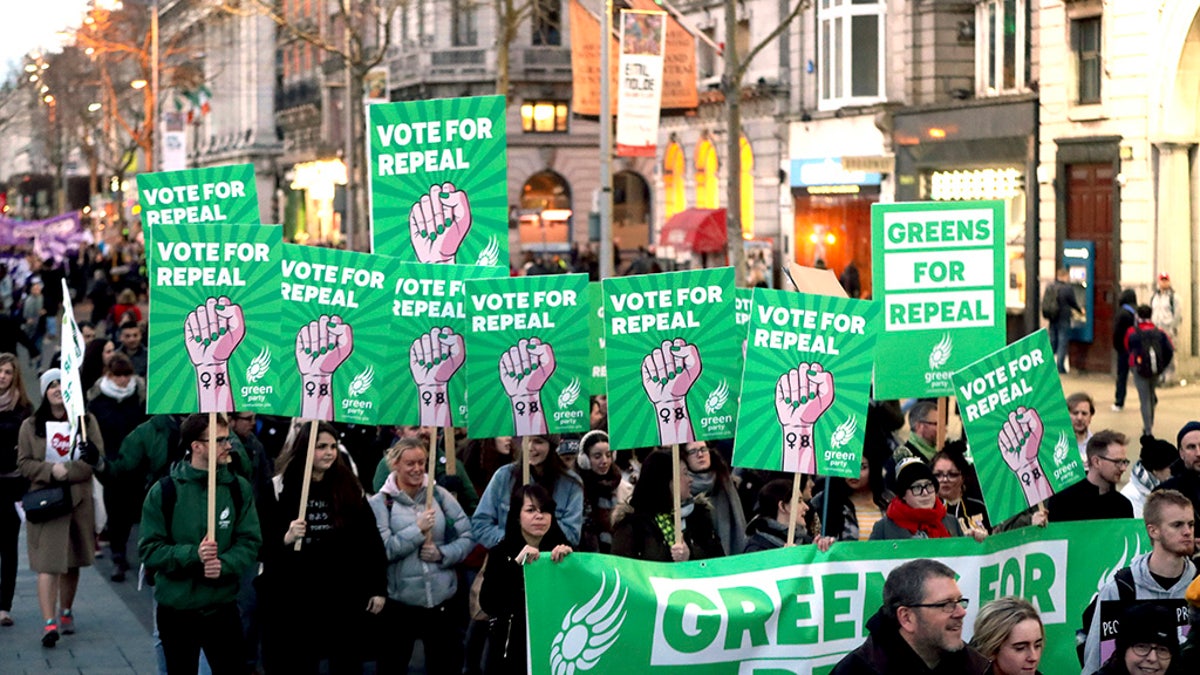
Pro-repeal demonstrators march ahead of Ireland's scheduled May 25 referendum on whether to repeal the 8th amendment to the Irish constitution, in Dublin, March 8, 2018. (Associated Press)
On May 25, citizens of Ireland will vote on whether to repeal the 1983 constitutional amendment recognizing the equal right to life of the unborn and banning abortion in all cases except the health of the mother, including potential suicide.
The referendum in the predominantly Roman Catholic country will be among the first tests of new policies by Facebook and Google to address concerns about election meddling raised by the Cambridge Analytica data scandal.
This month, Facebook announced it will block ads on the referendum that do not originate from advertisers in Ireland. CEO Mark Zuckerberg is vowing to have tighter restrictions on data that can influence politics.
A day after Facebook’s announcement, Google said it would suspend all ads related to the referendum until after the vote.
“Following our update around election integrity efforts globally, we have decided to pause all ads related to the Irish referendum on the Eighth Amendment,” Google said in a statement.
“Following our update around election integrity efforts globally, we have decided to pause all ads related to the Irish referendum on the Eighth Amendment.”
Ireland is one of the few developed Western nations to have strict anti-abortion laws.
Supporters of the repeal effort say the wording of the amendment does not allow lawmakers to grant exceptions in cases of rape or other circumstances. They argue that only by repealing this amendment can reasonable laws be made.
Pro-life groups say that if repealed, “there will be no laws to protect the unborn at all.”
One campaign slogan reads “Love Both,” promoting compassion for both mother and child.
Opponents of the repeal spoke out against the decisions by Facebook and Google.
A joint statement by three groups -- Save The 8th, Pro Life Campaign and the Iona Institute -- describes the tech companies' bans as “an attempt to rig the referendum.” They claim that the internet was “the only platform available to the NO campaign to speak to voters directly,” adding that is “now being undermined.”
James Mary McInerney, a friar at the Church of Visitation in north Dublin, said that as a Catholic it was his obligation to protect life.
“We believe all life is sacred and comes from God and is a gift from God,” he said.
He addressed his congregation by saying he was aware of Catholics who will vote "yes" to repeal the amendment, “You can’t do that and remain a Catholic.”
On average, nine Irish women a day travel to the United Kingdom for abortion services, and four women a day smuggle abortion pills into the country. Current Irish law carries a sentence of up to 14 years in prison for terminating a pregnancy.
In Dublin, Ireland’s capital and largest city, posters for and against the referendum line every major thoroughfare. Lawmakers approved the repeal amendment in March and say if the referendum passes, they will push legislation for abortion up to 12 weeks.
Opponents are trying to gain support with headlines reading “A License to Kill?”
The latest polls give a slight advantage to the pro-choice, "Repeal the 8th" movement, and believe their success will depend on the youth turnout. The deadline for voter registration was May 8.
In Galway, a pro-choice registration booth was set up on the iconic Shop Street, in hopes of informing and registering progressive young voters.
In rural communities such as Doolin in County Clare, the pro-life anti-repeal sentiment holds a majority.
Some voters are opting to not vote at all. A 60-year-old taxi driver in Dublin, who said he is personally against abortion, plans to stay away from the vote. He said it was “a women’s issue, and women should be the ones voting.”
All constitutional amendments in Ireland are subject to an open vote by the citizenry.
Ireland has a population of roughly 4.7 million people, with 78 percent considering themselves Catholic, according to the 2016 census.








































